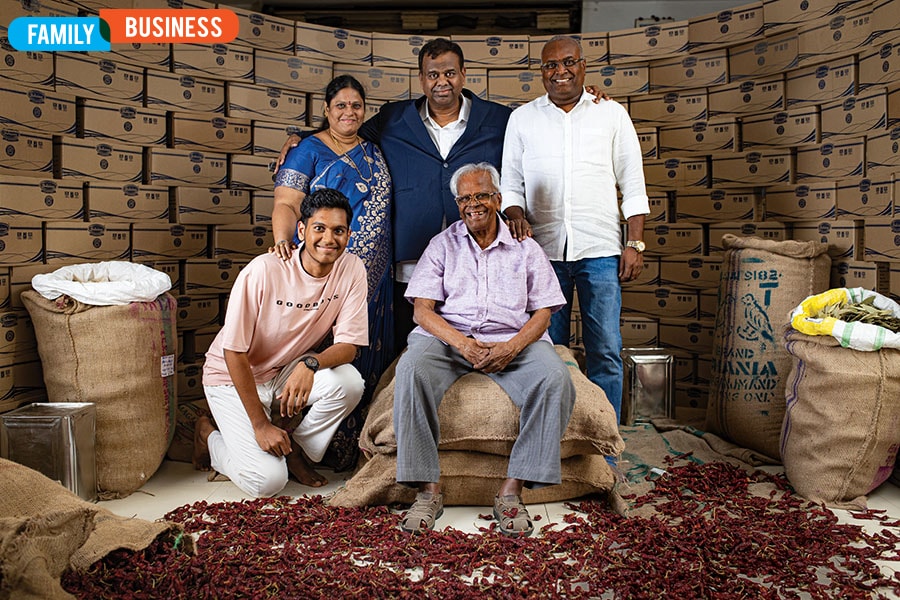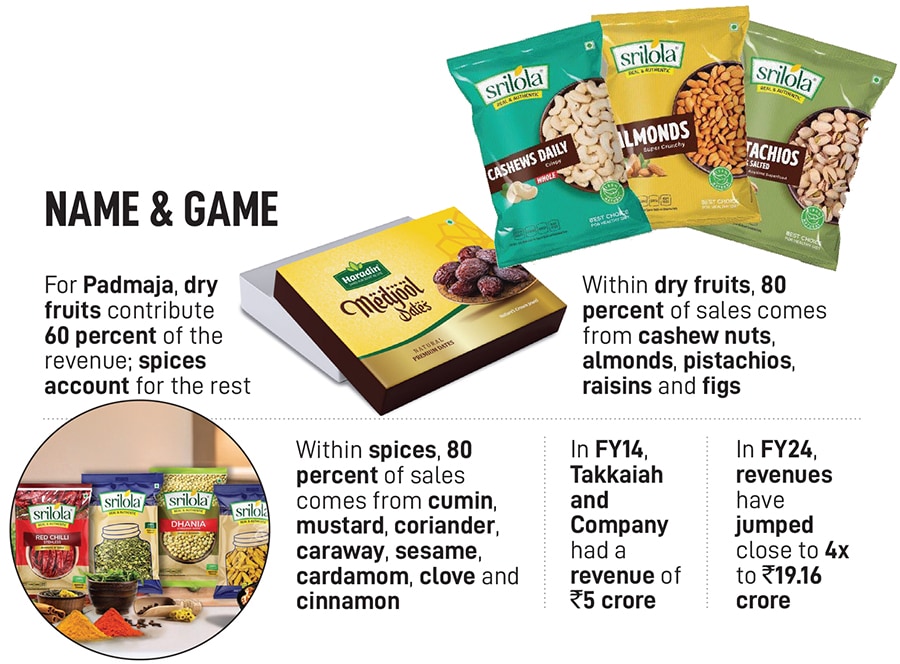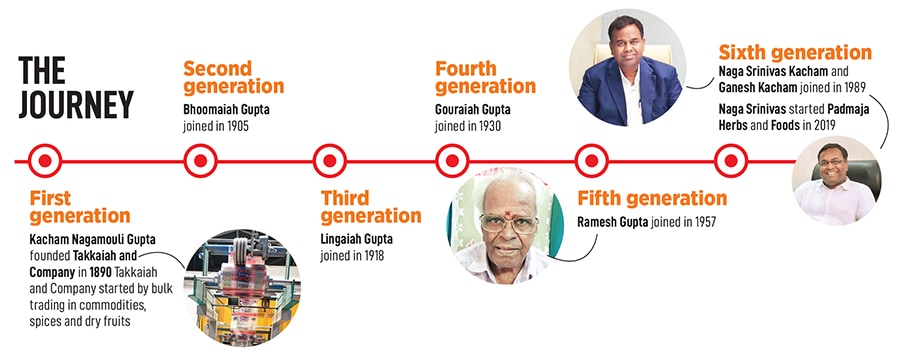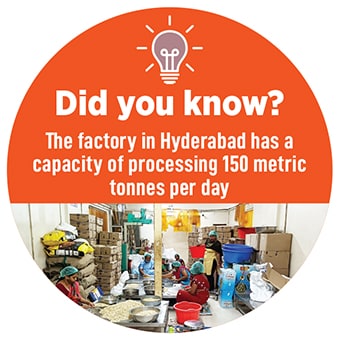Adapt, diversify and grow: How the Kacham family business survived six generations
Takkaiah and Company started in 1890 with bulk trading in commodities, spices and dry fruits. Through six generations it has gone from trading and a pure B2B play, to a distinct and differentiated B2C strategy that is finally playing out for the family
 (Top row from left) Padmaja Kacham, director at Padmaja Herbs and Foods, Naga Srinivas Kacham, managing director at Takkaiah & Padmaja Herbs and Foods, Ganesh Kacham, executive director at Takkaiah; (Bottom row from left) Shadbinda Kacham (son of Naga Srinivas Kacham), and Ramesh Gupta Kacham, director at Takkaiah
Image: Vikas Chandra Pureti for Forbes India
(Top row from left) Padmaja Kacham, director at Padmaja Herbs and Foods, Naga Srinivas Kacham, managing director at Takkaiah & Padmaja Herbs and Foods, Ganesh Kacham, executive director at Takkaiah; (Bottom row from left) Shadbinda Kacham (son of Naga Srinivas Kacham), and Ramesh Gupta Kacham, director at Takkaiah
Image: Vikas Chandra Pureti for Forbes India
Takkaiah and Company, Delicious, Swastik, Srilola, Haradin, Nufasal & McKinsey… an intriguing element binds all of them together. To decode the mysterious ingredient, let’s go back to 1890 when Kacham Nagamouli Gupta founded Takkaiah and Company in Hyderabad. The first-generation entrepreneur started bulk trading in commodities, spices and dry fruits. Over the next few decades, the family ballooned, subsequent generations joined the venture, and Takkaiah and Company added to its clout. The story remained the same post-Independence.
Then came the audacious gambit in 2019. Naga Srinivas Kacham, the sixth-gen from the family, launched Swastik, Srilola and Haradin. Kacham was playing a differentiated game in quality, quantity and reach. Sample this. Though all three brands sell nuts, dry fruits, spices, seeds and herbs, Kacham innovated the business strategy. Srilola was targeted at general stores, meant for the masses, packet size varied from 5 gm to 1 kg, and was pocket-friendly: ₹5 for five grams and ₹750 for a kilo. Haradin, on the other hand, had a premium positioning, wooed a discerning audience with deep pockets, was marketed via social media, and the cost ranged between ₹325 and ₹5,000.

Kacham explains why Haradin is a meaty bet for the founder. The brand, he underlines, has a differentiated offering. Take, for instance, turmeric. Haradin offers Lakadong turmeric, a special variety from Jaintia Hills of Meghalaya. If regular turmeric contains 1 percent of curcumin, the Lakadong version has over 7.5 percent. “For this brand, we are targeting high-networth individuals through Facebook and other social media platforms,” he says. Nufasal, meanwhile, was meant for a different audience: HORECA (hotels, restaurants and cafes).
Kacham’s gameplan was simple. First, the family business had been growing at a snail’s pace. It survived for generations, but the plane was stranded on the runway for decades. It was time for takeoff. Second, the only way to expand reach and gain mass was to enter the B2C market. Delicious and Swastik showed the way. Now the family had to target mass, class and institutional buyers. And the only way to achieve that was to roll out a new set of brands, frame a new marketing and advertising strategy, and amplify the brands beyond the City of Charminar.

Now, McKinsey enters and completes the story. Remember Takkaiah and Company, Delicious, Swastik, Srilola, Haradin, Nufasal, and McKinsey? Here is the missing part. In a study released in August, the global consulting company outlined five differentiators of outperforming family-owned businesses (FOB): Core operational distinctiveness, the effectiveness of the transition to the next generations, the level of diversification of the portfolio, talent, capabilities and culture, and robustness of the governance arrangements. To be billed as an outperforming business, a family has to tick all the boxes. Kacham’s family might not fall into this bucket, but it possesses the first three qualities and a bright chance to be tagged as an outperforming family business in the future.
Also read: How the Rs 1,000-crore Paramount Cables is rewiring its strategy
Outperforming family businesses not only last for generations, but they also adapt, diversify and grow. Srilola, Haradin and Nufasal are what Kacham needed to grow the business at a fast clip. From ₹5.64 lakh in FY20, the revenue has jumped to ₹14.43 crore in FY24. “We have set a processing capacity of 150 metric tonnes every day, which translates to 54,000 metric tonnes per annum,” says the sixth-gen founder, who started Padmaja Herbs and Foods in 2019, and rolled out the three new brands.
 Despite a generational transition, the foundations of the business remained intact. “Dedication, passion and resilience are needed to grow any business,” says Kacham, adding that the subsequent generation does its bit on two fronts. First, it adds to the core and diversifies. Second, it fans out. Padmaja Herbs and Foods has an offline retail presence across Telangana and Andhra Pradesh. Third, it adds technology and processes to keep the business updated.
Despite a generational transition, the foundations of the business remained intact. “Dedication, passion and resilience are needed to grow any business,” says Kacham, adding that the subsequent generation does its bit on two fronts. First, it adds to the core and diversifies. Second, it fans out. Padmaja Herbs and Foods has an offline retail presence across Telangana and Andhra Pradesh. Third, it adds technology and processes to keep the business updated.For Kacham, making a transition to B2C was not easy. The biggest challenge was generating capital for Padmaja.
The family had never taken loans. The business always generated cash and it was ploughed back into the venture. So, debt was an alien concept. For setting up a processing plant with world-class infrastructure, Kacham needed big money. While the family stonewalled a request to raise money under the parent company, it allowed the sixth-gen to start another company, roll out new brands, and raise a bank loan. Kacham registered the company in December 2013, and it became operational in 2019.
Back in the late 80s and early 90s, Kacham had another problem to contend with. The bulk trading business had inherent limitations: The transactions were in kilos, which curtailed the reach and hampered growth. Kacham spotted an opportunity, started smaller packs of 10 grams, and reached out to kiranas. “I started selling asafoetida in small packs in 1989,” he recalls, adding that once he booked an order for 110 kilos from the Secunderabad market. The family was shocked because it was not a bulk order. Kacham had to deliver 110 kilos in small packs of 10 gram. A brand was created—Swastik—and hing (asafoetida) became the talk of the town.
Cut to August. Kacham is ready to press on the gas pedal. A well-oiled retail footprint is in place, state-of-the-art manufacturing operational, and the sixth gen is hungry for growth. “Now is the time to dream big and achieve big,” he says.
 The challenges for the sixth gen, however, remain. The biggest is marketing, branding and taking on a clutch of new players. Over the last few years, the commodity business of nuts, dry fruits, millets and seeds has been getting a branding makeover. The pace has gathered steam, low-entry barriers have made it easy for smaller and regional players to enter into the fray, and the hefty margin of the business has enticed big and organised retail players. “The sixth gen has the first-mover advantage and a family legacy. But they need to step up the game,” reckons Ashita Aggarwal, professor of marketing at SP Jain Institute of Management and Research. “The family has stability and resilience. It needs to add pace.”
The challenges for the sixth gen, however, remain. The biggest is marketing, branding and taking on a clutch of new players. Over the last few years, the commodity business of nuts, dry fruits, millets and seeds has been getting a branding makeover. The pace has gathered steam, low-entry barriers have made it easy for smaller and regional players to enter into the fray, and the hefty margin of the business has enticed big and organised retail players. “The sixth gen has the first-mover advantage and a family legacy. But they need to step up the game,” reckons Ashita Aggarwal, professor of marketing at SP Jain Institute of Management and Research. “The family has stability and resilience. It needs to add pace.” Kacham, meanwhile, is aiming big. “I know this might sound over-ambitious, but I am aiming for a ₹1,000-crore turnover over the next few years,” he contends. The target might be realistic for a family that has survived six generations. All that Kacham needs is to replace survival instinct with growth instinct.


















